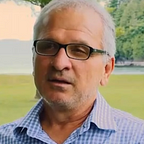A Reflection from the End of the World
For some time now I’ve been walking around beneath a dark, gray cloud. I can’t seem to get a handle on it, a kind of low depressive feeling, malaise. I can’t shake it.
Do you feel any of that?
Maybe it’s because I find myself anticipating intense negativity at every turn — and it comes, it’s there. News is gloomy, even funereal. One bit of bleakness follows another without relent. Maybe it’s because truth has been compromised; it’s nowhere visible. Honor and trust can’t be found. Do you trust anyone? And maybe it’s because this really is the end of something, a world we knew, and we’re transitioning into an unknown. We fear that.
But I think it’s more than that.
At the end of the world, a world I can’t understand at all, I’m thinking that we’ve become too comfortable with death. We anticipate it, don’t we? We’ve learned to accept that there will be violence somewhere and people will die, innocent people, children. We’re comfortable with that, it seems. And it’s making me depressed.
I awaken in a dark place because I’m asking myself hard questions, which I can’t answer — and I’m not sure I want to face. But I have to; there’s little choice:
What’s a life worth? Life everywhere we look is expendable. What is the material value of a life?
This is what I see, what I can’t get my head around: harsh economics determined by a handful of men — yes, men — conspires to determine a life’s value, your life and mine, the life of the Other we have yet to see, who we may never see yet lives as we live and wonders what this is all about, the purpose of a life, its meaning and relevance. The Other who, like you and me, lives beneath the heavy weight of man’s inhumanity to man.
Some lives are not relevant — a drowned Syrian child on a Turkish shore, dozens killed in a Kabul military hospital attack, a death scene on the 5700 block of South Calumet Avenue in Chicago, a sick person without insurance, which she can’t get. Las Vegas. Colombine. Sandy Hook. Now dark nouns forever forged in our collective imagination. Seven hundred and sixty eight people have been shot by police so far in 2017.
All of these tragedies know no borders; there are no walls holding this reality back. It can’t be hidden.
Death and tragedy are an indictment of who we are, what we’ve become, the world we’ve created as we argue and criticize, as we think about development and progress and neoliberalism and markets, tools to make ourselves feel good about civilization, about a nebulous tomorrow, our fears.
Only, when I look around — and this is what I think causes my bleakness, the darkness visible — I see great advances in technology and medicine and automation and industrialization, yet we’re stuck in a medieval mentality, a perverse inhumanity, a winner take all at anyone’s expense way of thinking, ravenous people destructively sniffing out dwindling resources.
In Aristotle’s mind humans are social animals by their nature. “Man is a political animal,” he says. Society is integral to humans, not only in their true nature, but in how humans come to perceive themselves. We’ve created society; we need it because it’s set up to nurture us — for us to nurture one another in its capacity to sustain us. It’s why society exists.
While perception of the self is connected to the role of society, Aristotle also says that humans construct their view of themselves by realizing their potentialities through the practice of virtue, which is why virtue is integral to human development.
Do you see virtue practiced anywhere?
It’s as if this “political animal” has rationalized his way out of humanity — the quality and sense of being human — and constructed a society that values one life over another.
Humanism, which comes from humanity, gives prime importance to human rather than divine or supernatural matters. I go along with that.
Humanist beliefs stress the potential value and goodness of human beings, emphasize common human needs, and seek solely rational ways of solving human problems.
You might say that the worth of your life and the lives of your loved ones are immeasurable. No price can be placed on your lives. Humanism, the humanist, works to extend this idea beyond the immediacy of family. Immeasurable love is the bedrock of society.
Yet our existence is defined by retreat. We turn from one another. It’s not immeasurable love that guides us, distrust directs us instead, as does fear. We are driven into defensive positions — my life is worth more than yours, especially if I can’t see you, especially if you’re invisible, a statistic in a geography unknown to me, and what I falsely think has nothing to do with me.
In this system, corruption, a perversion of integrity, reigns supreme. What we don’t realize, though, is that in order for dishonest proceedings to exist, the soul has to be already depraved.
What’s a life worth?
Nothing when the soul is depraved. In a corrupt society life is taken away, dismissed, first. This may be the bedrock of the new world we’re entering and it’s making us bleak, uncomfortable, confused.
